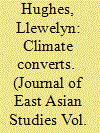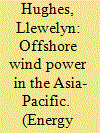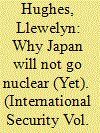|
|
|
Sort Order |
|
|
|
Items / Page
|
|
|
|
|
|
|
| Srl | Item |
| 1 |
ID:
111171


|
|
|
|
|
| Publication |
2012.
|
| Summary/Abstract |
A large literature in political economy argues that governments in the advanced industrialized states retrenched from the application of industrial policy while resisting pressure to reform in a limited number of sectors. In this article, I argue that retrenchment and resistance do not fully describe the range of choices made by governments. Through an analysis of investment in energy policy in Japan, I show that in addition to retrenching from industrial policies and resisting pressure to reduce industrial targeting, domestic actors have retained and redeployed state functions in public policy areas unaffected by the causes of liberalization.
|
|
|
|
|
|
|
|
|
|
|
|
|
|
|
|
| 2 |
ID:
155485


|
|
|
|
|
| Summary/Abstract |
Global production is increasingly organized through supply chains made up of firms that specialize in specific stages of production. This raises an important question: how does firms’ participation in global supply chains affect their trade preferences? Research shows that multinational corporations (MNCs) tend to prefer open trade, while domestic import-competing firms favor trade protection. We argue that the globalization of production also leads vertically specialized firms—those specializing in specific stages of the production process—to support open trade. Using firm-level data from the solar photovoltaics industry, we show that vertically specialized firms prefer open trade if they have ties to global supply chains. We present evidence that three sets of vertically specialized firms tend to favor open trade: upstream suppliers of inputs to a global supply chain, global manufacturers that import inputs, and downstream users of final products. Our findings suggest that the rise of global value chains shifts the politics of globalization: it expands firm coalitions in favor of open trade. Our findings also matter for an important public-policy concern: climate change. Governments face cross-cutting demands from solar firms over trade policy, dividing the growth coalition supporting clean energy technologies.
|
|
|
|
|
|
|
|
|
|
|
|
|
|
|
|
| 3 |
ID:
136641


|
|
|
|
|
| Summary/Abstract |
What is the relationship between oil and coercion? For decades states have worried that their dependence on oil gives producers a potential lever of coercion. The size, integration, and sophistication of the current OIL MARKET, however, are thought to have greatly attenuated, if not eliminated, the coercive potential of oil. The best way to analyze the current global oil market is by viewing it as a series of distinct market segments, from upstream production to midstream transport to downstream refining, with the potential for coercion varying across them. Oil-producing states do not have the greatest coercive potential in the international oil market. Instead, the United States remains the dominant presence, though its dominance has shifted from production—where it resided prior to World War II—to the maritime environment. These findings are significant for scholars’ and policymakers’ understanding of the relationship between oil and coercion. More generally, they suggest that studies of the potential for states to coerce others using economic instruments should take into account differences in the structure of markets for different goods.
|
|
|
|
|
|
|
|
|
|
|
|
|
|
|
|
| 4 |
ID:
192757


|
|
|
|
|
| Summary/Abstract |
Offshore wind power is an important technology option for decarbonising the electricity sector. An emerging region for the deployment of offshore wind is the Asia-Pacific. We conduct an expert elicitation of future cost expectations for offshore wind in the Asia-Pacific region, covering fixed-bottom and floating offshore wind technologies. We also examine views on policies that support the more rapid cost reductions for fixed bottom and floating offshore wind. We find expectations of decreases in the average levelized cost of electricity (LCOE) to USD72/MWh in 2040 (fixed-bottom) and USD81/MWh in 2050 (floating). The largest factors contributing to falling technology costs are identified as installation costs and capital costs for turbines and foundations, along with increased capacity factors. The creation of policy targets along with improved regulatory streamlining are identified as important policy measures that governments could implement to support technology cost reductions. We also find that preferred policy mixes depend on the level of technological maturity. Competitive tendering processes are identified as important for both technologies, but floating offshore wind auctions should be introduced after technology costs have fallen. In the near term, other policies are identified as more important for floating offshore technologies.
|
|
|
|
|
|
|
|
|
|
|
|
|
|
|
|
| 5 |
ID:
077103


|
|
|
|
|
| Publication |
2007.
|
| Summary/Abstract |
Japan's status as a nonnuclear weapons state remains of ongoing interest to policy analysts and scholars of international relations. For some, Japanese nuclearization is a question not of whether but of when. This article reassesses the state of the evidence on the nuclearization of Japan. It finds that support in Japan for the development of an independent nuclear deterrent remains negligible. Evidence demonstrates that ministries and agencies with responsibility for foreign and security policy have sought to consolidate Japan's existing insurance policies against nuclear threats-multilateral regimes and the extension of the U.S. nuclear deterrent to Japan-rather than seeking an indigenous nuclear deterrent. The article also finds, however, that the door to independent nuclearization remains ajar. Policymakers have ensured that constitutional and other domestic legal hurdles do not significantly constrain Japan from developing an independent nuclear deterrent. Further, recent centralization of authority in the prime minister and Cabinet Office has increased the freedom of action of leaders, enabling them to overcome political opposition to changes in security policy to a degree not possible in the past. This suggests that Japan's future position toward nuclear weapons could be more easily altered than before, should leader preferences change
|
|
|
|
|
|
|
|
|
|
|
|
|
|
|
|
|
|
|
|
|